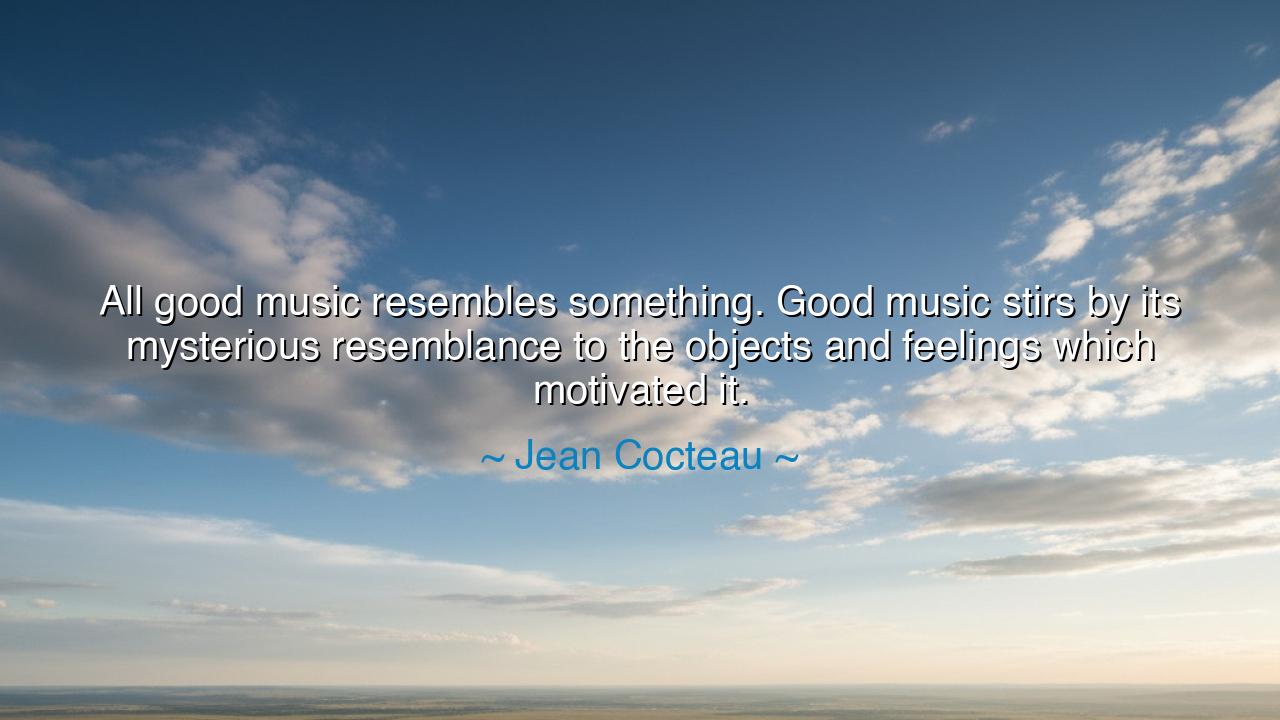
All good music resembles something. Good music stirs by its
All good music resembles something. Good music stirs by its mysterious resemblance to the objects and feelings which motivated it.






When Jean Cocteau spoke the words, “All good music resembles something. Good music stirs by its mysterious resemblance to the objects and feelings which motivated it,” he uncovered the hidden bond between sound and soul, between art and life itself. Music, in his vision, is never an empty echo nor a hollow noise—it is a mirror, a reflection of what already lives deep within us. It moves us not because of mere notes, but because those notes awaken memories, images, and feelings we already know, though perhaps could not name. Like a dream that resembles waking life, good music stirs us through this mystery of resemblance.
The ancients long recognized this power. They taught that certain modes of music could stir courage in warriors, while others could soothe sorrow or ignite love. To them, music resembled not just the voice of the lyre, but the rhythms of the universe itself—the beating of the heart, the rushing of the wind, the rise and fall of the ocean. It was powerful because it reflected the hidden order of nature, because it resembled the emotions and forces that shaped human destiny. In Cocteau’s words we hear this same truth: good music reaches into the eternal, and in its resemblance to what is real, it shakes us awake.
Consider the Ninth Symphony of Beethoven. Though written in silence by a man who could no longer hear, it resonates with triumph over suffering. Its resemblance is unmistakable: the struggles of humanity, the cries of despair, the rising hope, the final victory of joy. When audiences hear it, they do not marvel at notes alone—they recognize in it the battle and glory of their own lives. It is this mysterious resemblance that makes it immortal, that allows it to stir souls across centuries.
Cocteau’s wisdom reminds us that good music is never detached from life. It is born of objects—the streets walked, the voices heard, the landscapes remembered—and of feelings—the pain of loss, the joy of love, the fire of ambition. And when music is true to these roots, when it bears the mark of real experience, it speaks across barriers of time and tongue. A mother’s lullaby in one land resembles the lullaby of another, because both spring from the same feeling of tenderness. A mourning chant in one culture resembles another’s, because grief is universal.
Yet there is mystery in this resemblance. It is not always clear why one song reminds us of rain, or another of home, or another of the beloved who has gone. The connection is often hidden, subtle, even divine. This is why Cocteau calls it “mysterious.” Music does not merely copy life; it transforms it. It distills feelings into sound, and by doing so, it carries us into a deeper recognition of ourselves.
The lesson is this: if you wish to create, let your work resemble something true. Do not chase after cleverness alone, nor construct beauty without root. Draw from your own childhood, your own joys and sorrows, your own landscapes and encounters. For only that which is born of truth will resemble truth, and only that which resembles truth will stir the hearts of others. This is the secret of all enduring art.
Practically, this means living with open eyes and ears. Listen to the world around you—the cry of the child, the hum of the city, the stillness of the forest. Feel deeply, and do not hide from those feelings. Then, when you create—whether with pen, brush, or instrument—let those objects and feelings flow into your work. In this way, your creation will resemble life, and in resembling life, it will move others as life itself does.
Thus, Cocteau’s words guide us to the eternal law of art: good music stirs because it resembles life. It is in this resemblance—mysterious, powerful, universal—that we find the bridge between the artist and the audience, between the individual and the eternal. Let us then live deeply, create truthfully, and allow our songs to carry the echoes of all we have seen and felt, so that others, hearing them, may recognize themselves and be stirred.






AAdministratorAdministrator
Welcome, honored guests. Please leave a comment, we will respond soon